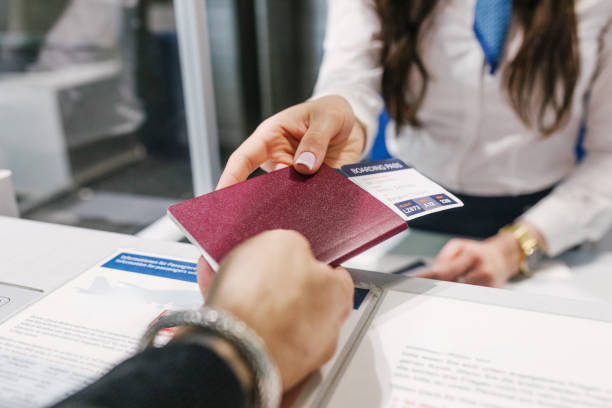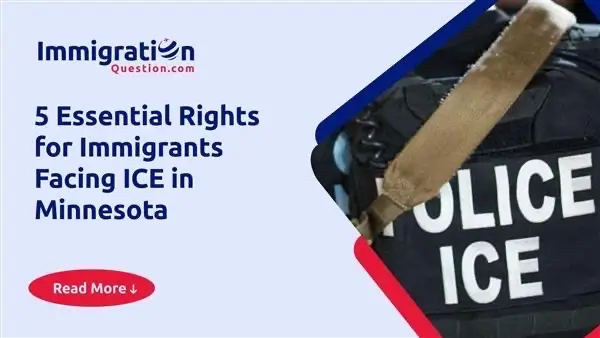Traveling to the United States can be an exciting experience, but it also comes with a series of immigration procedures that can confuse first-time visitors. Understanding what to expect and how to prepare can significantly ease your journey. This guide covers essential questions you might encounter during your U.S. airport immigration process, helping you navigate this critical aspect of your travel.
Understanding the U.S. Immigration Process
Upon arrival in the U.S., all travelers must go through immigration checks. This process is overseen by U.S. Customs and Border Protection (CBP) officers, who are responsible for ensuring that everyone entering the country has the appropriate documentation and is complying with U.S. laws. The primary goal of these checks is to protect the country while facilitating lawful international travel and trade.
1. What Documents Do I Need to Enter the U.S.?
To enter the United States, you must present a valid passport and a visa or an approved Electronic System for Travel Authorization (ESTA) if you’re from a Visa Waiver Program country. Ensure your passport is valid for at least six months beyond your intended stay, as some countries require this.
Commonly Required Documents:
- Passport: Must be valid and in good condition.
- Visa or ESTA: Depending on your nationality, a visa or ESTA is required for entry.
- Return Ticket: Proof of a return or onward travel ticket may be requested.
- Accommodation Details: You may need to provide information about where you will be staying.
- Financial Proof: Demonstrating that you have sufficient funds for your stay.
What Should I Expect During the Immigration Interview?
Upon arrival, you’ll undergo an immigration interview with a U.S. Customs and Border Protection (CBP) officer. This interview is an opportunity for the officer to verify your identity, the purpose of your visit, and the legitimacy of your travel intentions.
Typical Questions Include:
- Purpose of Visit: “Why are you visiting the United States?”
- Length of Stay: “How long do you plan to stay?”
- Accommodation: “Where will you be staying during your visit?”
- Occupation: “What do you do for a living?”
- Previous Visits: “Have you visited the U.S. before?”
- Return Plans: “Do you have a return flight booked?”
Be honest, concise, and clear in your responses. The goal is to demonstrate that you intend to comply with the terms of your visa or ESTA and that you plan to return to your home country after your visit.
3. What Are the Entry Restrictions and Requirements?
Entry into the United States can be subject to various restrictions and requirements, especially concerning public health concerns or security policies. It’s crucial to stay updated on these requirements, which can change frequently.
Key Considerations:
- Travel Bans and Restrictions: Be aware of any travel bans or restrictions that may apply to your country of origin.
- Health Protocols: This may include COVID-19 vaccination requirements, negative test results, or quarantine mandates.
- Special Permits or Authorizations: In some cases, specific permits or authorizations may be required for certain types of travel, such as for business or academic purposes.
4. What If I Am Denied Entry?
Denial of entry into the U.S. can occur for various reasons, including missing documentation, suspicion of violating visa terms, or health concerns. If you are denied entry, the CBP officer will provide a reason for the denial and instructions on what to do next.
Steps to Take:
- Request Clarification: Politely ask for a detailed explanation of the denial.
- Contact Your Embassy or Consulate: They can provide assistance and guidance.
- Review Your Options: Depending on the situation, you may be able to reapply for a visa or appeal the decision.
5. What Items Are Prohibited from Entry?
The U.S. has strict regulations regarding what items can and cannot be brought into the country. If not declared, prohibited items can lead to fines or even arrest.
Commonly Prohibited Items:
- Agricultural Products: Many fresh fruits, vegetables, plants, and animal products are restricted.
- Illegal Substances: Drugs and controlled substances are strictly prohibited.
- Weapons: Firearms, ammunition, and certain knives are prohibited.
- Counterfeit Goods: Items that infringe on intellectual property rights are prohibited.
Always declare any goods you bring into the country, even if you are unsure about their status.
6. How Do I Declare Items at U.S. Customs?
Upon arrival, you must complete a Customs Declaration form detailing any items you bring into the country. This form helps CBP officers assess duties and ensure that no prohibited items enter the U.S.
Declaration Tips:
- Be Thorough and Honest: Failure to declare items can result in penalties.
- Understand Duty-Free Limits: Certain goods may be subject to import duties if they exceed specified limits.
- Follow Instructions: The form will guide you on what information to provide.
7. What Should I Know About Secondary Inspection?
You may be referred to a secondary inspection if something unusual is noted during your primary inspection. This process involves a more detailed review of your documentation and possibly a luggage search.
What to Expect:
- Additional Questions: The officer may ask more detailed questions about your travel plans.
- Document Review: They may examine your travel documents more closely.
- Luggage Inspection: Your belongings may be searched.
While secondary inspection can be intimidating, it’s often a routine procedure. Remain calm and cooperate fully.
8. Can I Travel Within the U.S. on a Visitor Visa?
Yes, once you’ve been admitted to the U.S. on a visitor visa, you can travel freely. However, your visa status does not change with internal travel; you must leave the U.S. by the end of your authorized stay.
Travel Tips:
- Carry Identification: Always carry your passport and visa documentation when traveling domestically.
- Know Your Rights: Understand your rights and responsibilities under your visa status.
- Comply with Visa Terms: Penalties can result from engaging in activities not allowed under your visa, such as unauthorized work.
9. What Are the Procedures for Departing the U.S.?
When leaving the United States, ensure your departure is properly recorded to avoid future visa issues. Failure to do so can lead to misunderstandings about your stay duration and impact future travel plans.
Departure Steps:
- Surrender Your I-94 Form: If applicable, surrender your I-94 form (Arrival/Departure Record) to the airline.
- Keep Records: Maintain documentation of your departure, such as boarding passes or flight itineraries.
- Check Visa Status: Ensure your visa or ESTA is still valid if you plan to return to the U.S.
10. What Resources Are Available for Assistance?
If you encounter issues during your U.S. immigration process, various resources can assist you. The U.S. Citizenship and Immigration Services (USCIS) and the Department of State websites offer comprehensive information and guidance.
Useful Resources:
- USCIS Website: For information on visa status, extensions, and changes.
- U.S. Customs and Border Protection (CBP): For entry requirements and traveler information.
- Embassy or Consulate: For country-specific guidelines and assistance.
Common Airport Immigration Questions
-
What Is Your Purpose of Visit?
One of the first questions asked by immigration officers is about the purpose of your visit. Whether you are visiting for tourism, business, study, or any other reason, it is crucial to clearly state your purpose and provide supporting documentation if necessary. For example, tourists should have hotel reservations, while business travelers might present an invitation letter from a U.S. company.
-
How Long Do You Plan to Stay?
Another critical question is the length of your stay in the U.S. Immigration officers want to ensure visitors do not overstay their visas. It is important to provide a clear and honest answer that aligns with your visa duration and travel plans.
-
Where Will You Be Staying?
The address of where you will stay in the U.S. is a common requirement. This could be a hotel, a friend’s or relative’s home, or other accommodations. It is advisable to have this information readily available, as immigration officers may ask for it to verify your travel plans.
-
Do You Have a Return Ticket?
Proof of a return or onward journey is often required. This shows that you intend to leave the U.S. within the allowed timeframe. Having a return ticket can also help alleviate concerns about potential overstays.
-
Have You Visited the U.S. Before?
Immigration officers may inquire about your previous visits to the U.S. This includes any prior stays, the nature of those visits, and whether you complied with visa regulations. Consistency in your travel history and compliance with visa conditions can facilitate a smoother immigration process.
-
What Is the Source of Your Funds?
Financial stability is a significant concern for immigration authorities. They need to be assured that you can support yourself financially during your stay in the U.S. without seeking employment or government assistance. Be prepared to provide evidence of sufficient funds, such as bank statements, especially if you are traveling on a tourist visa.
-
Are You Bringing Any Prohibited Items?
The U.S. has strict regulations on what can and cannot be brought into the country. Immigration officers will ask if you carry prohibited items such as fresh food, plants, animals, or large sums of cash. It is important to declare any such items to avoid penalties or confiscation.
-
Do You Have Any Criminal Record?
Having a criminal record does not automatically disqualify you from entering the U.S., but it is a significant factor in the immigration process. Be truthful when answering this question, as dishonesty can lead to severe consequences, including denial of entry.
Tips for Answering Airport Immigration Questions
- Be Honest: Always provide truthful and accurate information. Misleading or false statements can lead to denial of entry or future visa complications.
- Be Polite and Cooperative: Responding politely and cooperating with the immigration officers can make the process smoother and quicker.
- Have Documentation Ready: Carry all necessary documents, such as your passport, visa, travel itinerary, and any supporting documents related to your stay.
- Know Your Rights: While it is important to comply with the immigration process, you also have rights. For example, you can request an interpreter if needed and are not obligated to answer questions irrelevant to your entry or visa status.
Frequently Asked Questions About U.S. Airport Immigration
Q1: Can I enter the U.S. without a visa?
Yes, if you are from a country participating in the Visa Waiver Program (VWP) and staying for 90 days or less for tourism or business purposes. However, you must still obtain authorization through the Electronic System for Travel Authorization (ESTA) before traveling.
Q2: What happens if I am denied entry at the airport?
If you are denied entry, the immigration officer will typically explain the reason, and you may be sent back to your country of origin on the next available flight. In some cases, you may be allowed to withdraw your application for admission, avoiding a formal denial of entry record.
Q3: Can I be searched by immigration officers?
Immigration officers can search your belongings and ask detailed questions to determine your admissibility. This can include searching your electronic devices, although you have the right to refuse to provide passwords, which may result in the devices being detained.
Q4: How can I avoid problems with U.S. immigration?
- Ensure all documentation is in order: This includes a valid passport, visa, and any other required documents.
- Be clear about your travel plans: Have a detailed itinerary and proof of accommodations.
- Declare any items of concern: This includes large sums of cash or items that may be restricted or prohibited.
Conclusion
Navigating U.S. airport immigration can seem daunting, but being well-prepared can make the process smoother. Understanding the common questions and knowing how to respond appropriately is key. Remember, the goal of the immigration process is to ensure the safety and security of the U.S. while facilitating legitimate travel. By following the guidelines and being prepared for airport immigration questions, you can enjoy a stress-free entry into the United States.











